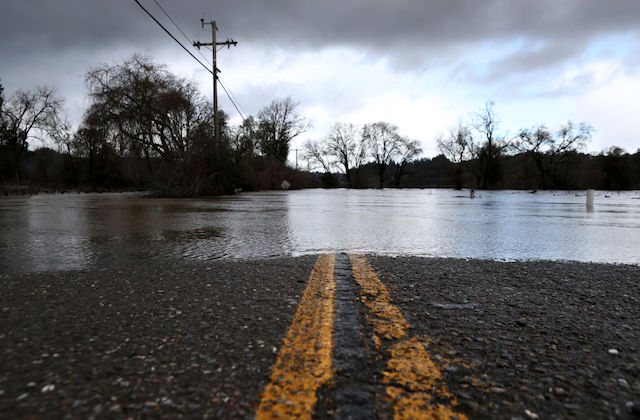The Yankton Sioux reservation in South Dakota has experienced flooding rains and a series of other extreme weather events over the past year. While the state has received federal recovery money for surrounding areas that were affected, the sovereign nation has been turned down by the Federal Emergency Management Agency (FEMA), the National Guard and other federal agencies.
The Yankton Sioux is a sovereign nation and one of seven tribes in South Dakota. Unemployment rates on the reservation are at 85 percent, reports The Guardian, and a third of the population of 9,000 live in federal public housing projects managed by the tribal housing authority. Many residents do not have flood insurance. Furthermore, under the Trump administration, they have experienced budget cuts.
Since last winter, the White Swan community, located on the reservation, has been hit by a continuous cycle of catastrophic weather. Reports The Guardian:
rnt
After several years of low water levels, the lake has been flooded since early March when a bomb cyclone—heavy snow, wind and rain—hit the area. The aging aqueduct, which should divert excess water from the lake to the Missouri River, was overwhelmed by the extreme rainfall. (Until the water recedes, full inspections are impossible.)
t
In White Swan, groundwater and waste flowed into basements as the sewage station neared collapse; the highway and powwow arena were inundated.
t
A month later, another cyclone struck, followed by a second consecutive summer of record rainfall, causing havoc for local farmers already struggling due to the president’s trade wars.
There have been three federal major disaster declarations for the state as a result of the climate events. The tribe has also reached out for federal assistance, without a lot of success. The National Guard denied a tribal request in September, which would have included loading sandbags around the lake and community center as a barrier to rainwater.
“The governor and FEMA deny claims the community was abandoned, and say work with the tribe is ongoing,” says The Guardian, adding that last week, the reservation was included in the latest federal disaster declaration, which will allow residents and the tribe to submit claims for disaster planning, infrastructure projects and reimbursement for repairs.
Aside from flooding and destruction of property, the weather has caused a number of health issues. These include lung infections and challenges to growth and development in children, attributed primarily to the mold that now covers many surfaces inside homes.
In response, according to The Guardian, a grassroots collective of women—led by Shelly Saunsoci, tribal employment rights director—has organized to take care of sick children and distribute clothing, food and furniture attained through The Salvation Army and American Red Cross.
Said Saunsoci in an interview with the Guardian: “The floods have caused a lot of hardships, it feels like the third world.”
To learn more about the relief effort, go here.
